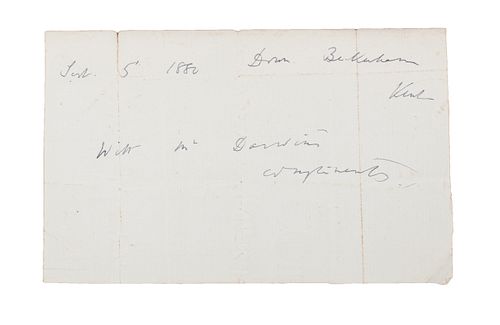DARWIN, Charles Robert (1809-1882). On the Origin of Species by Means of Natural Selection. London: W. Clowes and Sons for John Murray, 1859.
Lot 40
About Seller
Hindman
1338 West Lake Street
Chicago, IL 60607
United States
Recognized as the Midwest's leading fine art auctioneers, Hindman Auctioneers has built a worldwide reputation based on a full service approach to the auction business tailored to meet the individual needs of our clients. Coming from a variety of educational backgrounds, specialists bring years of e...Read more
Categories
Estimate:
$60,000 - $80,000
Absentee vs Live bid
Two ways to bid:
- Leave a max absentee bid and the platform will bid on your behalf up to your maximum bid during the live auction.
- Bid live during the auction and your bids will be submitted real-time to the auctioneer.
Bid Increments
| Price | Bid Increment |
|---|---|
| $0 | $25 |
| $500 | $50 |
| $1,000 | $100 |
| $2,000 | $250 |
| $5,000 | $500 |
| $10,000 | $1,000 |
| $20,000 | $2,500 |
| $50,000 | $5,000 |
| $100,000 | $10,000 |
About Auction
By Hindman
Oct 8, 2020
Set Reminder
2020-10-08 11:00:00
2020-10-08 11:00:00
America/New_York
Bidsquare
Bidsquare : Selections from the Library of Gerald and Barbara Weiner
https://www.bidsquare.com/auctions/hindman-auctions/selections-from-the-library-of-gerald-and-barbara-weiner-5544
Hindman Bidsquare@hindmanauctions.com
Hindman Bidsquare@hindmanauctions.com
- Lot Description
DARWIN, Charles Robert (1809-1882). On the Origin of Species by Means of Natural Selection. London: W. Clowes and Sons for John Murray, 1859.
8vo (198 x 122mm). Half-title [with 2 quotations on the verso]. Folding lithographic diagram by William West after Darwin. 32-page publisher's catalogue dated June 1859 [Freeman variant 3] bound at end. (Preliminary leaves, including title, with margins brittle and with some chipping; half-title slightly short with split at gutter tissue-repaired; some minor marginal toning.) Original green cloth by Edmonds & Remnants with their ticket on the lower pastedown, covers panelled in blind, the spine lettered and decorated in gilt [Freeman variant a] (recased preserving original endpapers, spine dulled and repaired at ends, some wear to joints and extremities); quarter morocco folding case. FIRST EDITION OF "THE MOST IMPORTANT SINGLE WORK IN SCIENCE" (Dibner). Although some key observations and findings from the voyage of the Beagle acted as his initial inspiration, Darwin's ideas about the beneficial mutation of species did not coalesce into the theory of evolution until his reading of Thomas Malthus's Essay on the Principle of Population in the latter half of 1838. In his Essay, Malthus presented a statistical argument that unrestrained human populations breed beyond their means and struggle to survive; Darwin related Malthus's argument to the competition for resources among wildlife and to botanist de Candolle's "warring of the species" in plants. It became clear to him that general competition among living things was part of the "struggle for existence," and only the best-adapted survived. Although the idea of species evolution can be traced to the Greek "great chain of being," Darwin's eventual argument for the existence of a viable mechanism - natural selection - made the concept acceptable to the scientific community. He completed a 35-page sketch of his evolutionary theory in June 1842, which he converted into a 231-page essay by February 1844. He returned to his notes in late 1854, and after consulting Charles Lyell, began writing an extended treatise for his scientific peers on 14 May 1856. Nearly two years later, in March 1858, "Natural Selection" was two-thirds complete at 250,000 words, and was projected to be published as a three-volume work. In June of the same year, he received a letter form Alfred Russell Wallace regarding his own independent conclusions about evolution. Both scientists presented papers to the Linnean Society on 1 July 1858. At Joseph Dalton Hooker's suggestion, Darwin completed an abbreviated manuscript of "Natural Selection," comprising 155,000 words, in April 1859. Stripped of references, the new work was not aimed at specialists, but rather the general reading public. The work was published as On the Origin of Species on 24 November 1859 in an initial print run of 1250 copies, and has since become regarded as "a turning point, not only in the history of science, but in the history of ideas in general" (DSB).
With "species" misspelled "speceies" on page 20, with the whale-bear story in full on page 184. Dibner, Heralds of Science 199; Heirs of Hippocrates 1724; Freeman 373; Garrison-Morton (1991) 220; Grolier, Science 23b; Norman 593; PMM 344b; Sparrow, Milestones 49; Waller 10786. [Laid-in:] DARWIN, Charles. Autograph note signed in the third person to an unnamed recipient. 5 Sept 1880. 1 page, 110mm by 176mm. In full: "Sept 5th 1880 / Down Beckenham / Kent / With Mr. Darwin's compliments". (Creased and soiled at folds.)
For condition inquiries please contact Gretchen Hause at gretchenhause@hindmanauctions.comCondition
- Shipping Info
-
Please refer to https://hindmanauctions.com/shipping-packing
-
- Buyer's Premium



 EUR
EUR CAD
CAD AUD
AUD GBP
GBP MXN
MXN HKD
HKD CNY
CNY MYR
MYR SEK
SEK SGD
SGD CHF
CHF THB
THB













